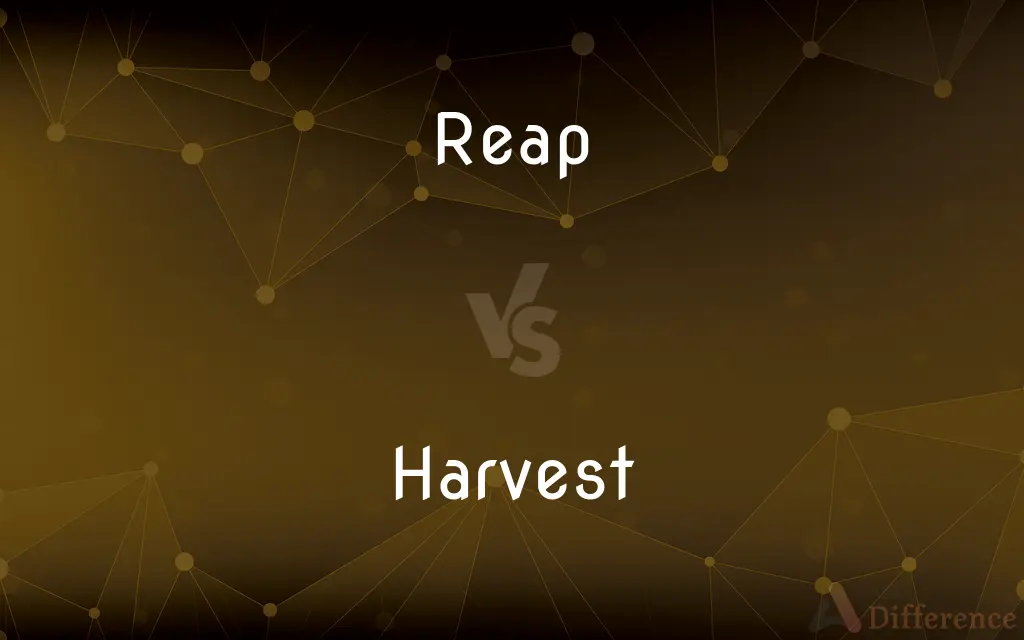Reap vs. Harvest — What's the Difference?
By Urooj Arif & Fiza Rafique — Updated on April 2, 2024
Reap refers specifically to cutting or gathering of crops that are ready to be harvested, focusing on action of collecting mature crops. Harvest encompasses entire process of gathering mature crops from the fields, including reaping, & preparing for sale.

Difference Between Reap and Harvest
Table of Contents
ADVERTISEMENT
Key Differences
Reap is the act of cutting or gathering crops, often done manually or with machinery, emphasizing the physical act of collecting crops. Harvest, on the other hand, is a broader term that includes not only reaping but also the subsequent stages of processing and gathering the yield.
While "reap" traditionally involves the cutting down of grain or other crop plants, "harvest" refers to the period or season when the reaping and gathering of crops occurs, reflecting both the time frame and the full scope of activities.
The concept of reaping is closely associated with the immediate act of cutting or picking crops, often implying a direct, hands-on approach. Harvesting not only involves reaping but also entails the overall management and collection of the agricultural yield, indicating a comprehensive process.
Reaping can symbolize the consequences of actions or the outcomes of efforts in metaphoric uses, such as "reaping what you sow." Harvesting, while it can also be used metaphorically, tends to maintain a focus on the culmination of a growing season and the success of agricultural efforts.
Comparison Chart
Definition
The act of cutting or gathering crops.
The process of gathering mature crops, including reaping, threshing, and processing.
ADVERTISEMENT
Focus
Specifically on the cutting or picking of crops.
On the entire process of collecting and processing crops.
Usage
Often implies manual or mechanical action.
Encompasses both the period and the activities of gathering crops.
Connotation
Can symbolize the results of actions or efforts.
Tends to focus on the yield and success of agricultural activities.
Examples
Hand reaping wheat in a field.
The wheat harvest includes reaping, threshing, and bagging.
Compare with Definitions
Reap
To harvest a crop.
It’s time to reap the barley for this year.
Harvest
To gather the mature crops from the fields.
They began to harvest the grapes as soon as they ripened.
Reap
To cut or gather (crops or harvest) from the fields.
Farmers reap the corn at the end of the growing season.
Harvest
The process or period of gathering in crops.
The harvest season is busy for farmers, marking the culmination of a year's work.
Reap
Metaphorically, to receive as a consequence of one's own actions.
You reap what you sow, meaning your actions dictate your outcomes.
Harvest
The yield from plants in a single growing season.
This year’s harvest was particularly abundant, thanks to the favorable weather.
Reap
To obtain a result or reward.
After years of hard work, she finally reaped the benefits of her dedication.
Harvest
A time of year when crops are ripe and ready to be gathered.
Harvest time brings the community together to celebrate.
Reap
To cut or harvest with a sickle, scythe, or reaper.
In traditional farming, workers used to reap wheat by hand.
Harvest
The act of collecting mature crops from the fields.
Harvesting wheat requires careful timing to maximize yield.
Reap
To cut (grain or pulse) for harvest with a scythe, sickle, or reaper.
Harvest
Harvesting is the process of gathering a ripe crop from the fields. Reaping is the cutting of grain or pulse for harvest, typically using a scythe, sickle, or reaper.
Reap
To harvest (a crop).
Harvest
The act or process of gathering a crop.
Reap
To harvest a crop from
Reaping a field.
Harvest
The crop that ripens or is gathered in a season.
Reap
To obtain as a result of effort
She reaped large profits from her unique invention.
Harvest
The amount or measure of the crop gathered in a season.
Reap
To cut or harvest grain or pulse.
Harvest
The time or season of such gathering
Harvest lasts about six weeks.
Reap
To obtain a return or reward.
Harvest
The result or consequence of an action
Our trip to the Grand Canyon yielded a rich harvest of memories.
Reap
(transitive) To cut (for example a grain) with a sickle, scythe, or reaping machine
Harvest
To gather (a crop)
Harvested wheat.
Reap
(transitive) To gather (e.g. a harvest) by cutting.
Harvest
To extract from a culture or a living or recently deceased body, especially for transplantation
Harvested bone marrow.
Reap
(transitive) To obtain or receive as a reward, in a good or a bad sense.
To reap a benefit from exertions
Harvest
To gather a crop from (land, for example)
Harvest an apple orchard.
Reap
To terminate a child process that has previously exited, thereby removing it from the process table.
Until a child process is reaped, it may be listed in the process table as a zombie or defunct process.
Harvest
To receive or collect (energy)
A turbine that harvests energy from tidal currents.
Reap
To deprive of the beard; to shave.
Harvest
To receive (the benefits or consequences of an action)
Harvest the rewards of hard work.
Reap
A bundle of grain; a handful of grain laid down by the reaper as it is cut.
Harvest
To gather a crop.
Reap
To cut with a sickle, scythe, or reaping machine, as grain; to gather, as a harvest, by cutting.
When ye reap the harvest of your land, thou shalt not wholly reap the corners of thy field.
Harvest
The third season of the year; autumn; fall.
Harvest is usually very damp and rainy.
Reap
To gather; to obtain; to receive as a reward or harvest, or as the fruit of labor or of works; - in a good or a bad sense; as, to reap a benefit from exertions.
Why do I humble thus myself, and, suingFor peace, reap nothing but repulse and hate?
Harvest
The season of gathering ripened crops; specifically, the time of reaping and gathering grain.
Reap
To clear of a crop by reaping; as, to reap a field.
Harvest
The process of gathering the ripened crop; harvesting.
Reap
To deprive of the beard; to shave.
Harvest
The yield of harvesting, i.e., the gathered crops or fruits.
This year's cotton harvest was great but the corn harvest was disastrous.
Reap
To perform the act or operation of reaping; to gather a harvest.
They that sow in tears shall reap in joy.
Harvest
(by extension) The product or result of any exertion or course of action; reward or consequences.
Reap
A bundle of grain; a handful of grain laid down by the reaper as it is cut.
Harvest
(paganism) A modern pagan ceremony held on or around the autumn equinox, which is in the harvesting season.
Reap
Gather, as of natural products;
Harvest the grapes
Harvest
(transitive) To bring in a harvest; reap; glean.
Reap
Get or derive;
He drew great benefits from his membership in the association
Harvest
(intransitive) To be occupied bringing in a harvest
Harvesting is a stressing, thirsty occupation
Harvest
(transitive) To win, achieve a gain.
The rising star harvested well-deserved acclaim, even an Oscar under 21
Harvest
The gathering of a crop of any kind; the ingathering of the crops; also, the season of gathering grain and fruits, late summer or early autumn.
Seedtime and harvest . . . shall not cease.
At harvest, when corn is ripe.
Harvest
That which is reaped or ready to be reaped or gathered; a crop, as of grain (wheat, maize, etc.), or fruit.
Put ye in the sickle, for the harvest is ripe.
To glean the broken ears after the manThat the main harvest reaps.
Harvest
The product or result of any exertion or labor; gain; reward.
The pope's principal harvest was in the jubilee.
The harvest of a quiet eye.
Harvest
To reap or gather, as any crop.
Harvest
The yield from plants in a single growing season
Harvest
The consequence of an effort or activity;
They gathered a harvest of examples
A harvest of love
Harvest
The gathering of a ripened crop
Harvest
The season for gathering crops
Harvest
Gather, as of natural products;
Harvest the grapes
Harvest
Remove from a culture or a living or dead body, as for the purposes of transplantation;
The Chinese are said to harvest organs from executed criminals
Common Curiosities
Is harvesting only related to agriculture?
While primarily associated with agriculture, the term "harvest" can also refer to gathering other resources, such as harvesting solar energy.
How has the meaning of harvesting changed with modern agriculture?
With modern agriculture, harvesting has come to include the use of machinery and technology to improve efficiency and yield, broadening its meaning beyond manual gathering.
What does it mean to reap a field?
To reap a field means to cut down or gather the crops that are ready for harvest from that field.
What tools are used for reaping?
Traditional tools for reaping include sickles and scythes, while modern farming may use mechanical reapers and combine harvesters.
How do you know when it's time to reap or harvest?
Timing for reaping or harvesting depends on the type of crop and is usually when the crops are mature and ready, often determined by color, size, and texture.
What role does weather play in the harvesting process?
Weather conditions critically influence the timing and success of both reaping and harvesting, affecting crop maturity and harvestability.
What does the phrase "reap what you sow" mean?
It means that actions have consequences, and people will eventually face the outcomes of their actions, good or bad.
Can the terms reap and harvest be used interchangeably?
In many contexts, they are used interchangeably, especially in a broad sense. However, "reap" specifically refers to the act of cutting or picking, while "harvest" encompasses the entire process of gathering crops.
How do farmers prepare for the harvest season?
Preparation includes monitoring crop maturity, maintaining harvesting equipment, and planning for labor and storage needs.
How is harvesting celebrated around the world?
Many cultures celebrate the end of the harvest season with festivals and gatherings, thanking for the bounty and marking the end of a cycle.
Can reap be used in a non-agricultural context?
Yes, reap is often used metaphorically to describe the outcome or rewards of one’s actions in various contexts.
What innovations have improved harvesting techniques?
Innovations include the development of more efficient machinery, precision agriculture technologies, and practices that reduce waste and increase sustainability.
What is the importance of the harvest season?
The harvest season is crucial for farmers as it determines the yield of their crops, directly affecting their income and the food supply.
What are the environmental impacts of harvesting?
Harvesting can impact the environment through land use changes, habitat disruption, and the use of resources, emphasizing the need for sustainable practices.
What happens after the harvest is completed?
After the harvest, crops are processed, stored, or sold, and fields are prepared for the next planting season.
Share Your Discovery

Previous Comparison
Enterprise vs. Agency
Next Comparison
Stag vs. ElkAuthor Spotlight
Written by
Urooj ArifUrooj is a skilled content writer at Ask Difference, known for her exceptional ability to simplify complex topics into engaging and informative content. With a passion for research and a flair for clear, concise writing, she consistently delivers articles that resonate with our diverse audience.
Co-written by
Fiza RafiqueFiza Rafique is a skilled content writer at AskDifference.com, where she meticulously refines and enhances written pieces. Drawing from her vast editorial expertise, Fiza ensures clarity, accuracy, and precision in every article. Passionate about language, she continually seeks to elevate the quality of content for readers worldwide.














































